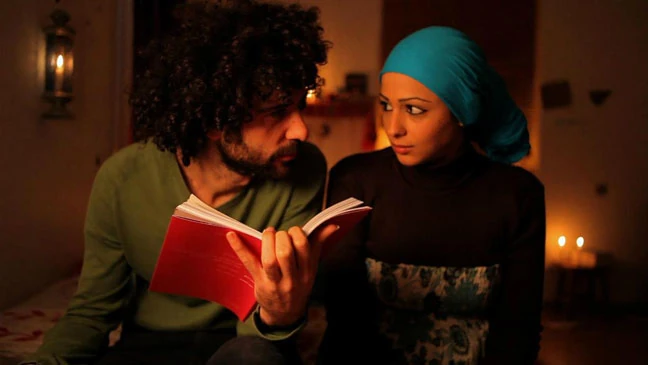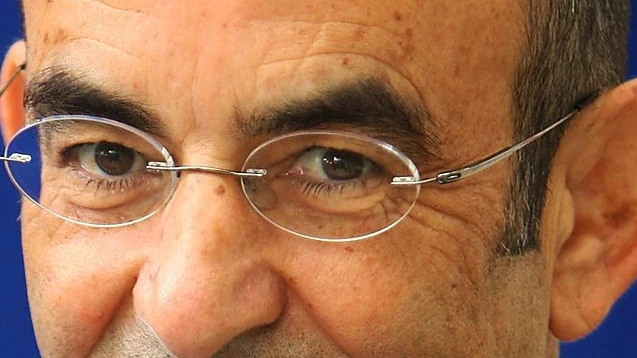حبيبي راسك خربان
Habibi (2011)
Having gone through the slog of wrting an intro piece, putting together those lists - (this one and this one!!!), and film poster pics, and neatly arranging the HTML as best I could, I asked myself the question of where on earth to begin. Do I start with a film about one of the many wars that have ravaged the Middle East in the last seventy-five years? Should I begin with an Israeli film interrogating the ideology of the settlers? Or do I try to go chronologically, and start at the historical roots?
And then I need to remind myself that I’m not trying to write my PhD thesis here. These are just emotional reactions to films that react to and reflect on anything that ails the Middle East (occasionally with some humour, thankfully).
So let us begin with a love story from the place where the pain is currently most strongly felt (and of course has been felt for a long time), and which right now is the focus of the world’s gaze. Gaza. Gaze. Some weak pun available there? I’ll step back from that.
No spoilers about what happens to the lovers in this story, but the reader may safely assume that it’s not easy for lovers from different tribes/families to be stuck between Israeli occupation and Hamas theocracy. The film retells, in contemporary Gaza, the classical Arabic poem about the forbidden love of the poet Qays ibn al-Mulawwah, also known as Majnun (crazy, possessed by jinn, evil spirits) for his childhood sweetheart Layla al-Aamiriya. Read all about it on Wikipedia but not before you’ve seen the movie if you don’t want any spoilers.

Both characters are outsiders in a highly conformist and of course a very brutalised place. Qays is a freethinker in a society where thought is very strictly policed, an intellectual with no opportunities, unable to finish his studies in Ramallah because of border closures, who has found himself working on a building site. He’s “not good enough”, and Layla’s pious traditionalist father has decided who she is going to marry - an unattractive older man, but crucially a doctor - the ultimate status in the Arab World. In the scene where Layla is introduced to her appointed spouse, her father asks him about his political views, and he dutifully says “Hamas, of course”. When he in turn asks Layla about her allegiance, she tells him that she supports [the PFLP] https://en.wikipedia.org/wiki/Popular_Front_for_the_Liberation_of_Palestine). The ultimate outsider political opinion in a society divided between Hamas and Fatah. There’s also a plotline about Layla’s brother becoming radicalised and active in Hamas’ suppression of independent thinking and political activity in Gaza, which was already half a decade old by the time that this film was made. This isn’t Israeli hasbara (“propaganda” - kind of - but more literally you could translate hasbara as “explaining it away”). It’s a film made by Palestinians for the world to see the reality of the place.
I don’t think that I need to say a lot more. You have the trailer here, and after that you can find this movie on Netflix. The film does seem a bit hard to find elsewhere, however. It’s listed on the Palestine Film Institute website, but I don’t see any possibility for watching it online there. I’ve seen no possibility of finding it in DVD form on Amazon or eBay, but you may do better than me on that score. I think that it deserves a better distribution. Without knowing anything of the classical love story that it alludes to, the adjective that came into my British mind was “Shakespearian”. Fortunately for millenials and Gen Z, it’s not as long as the average Shakespeare, so you might get through without the urge to pick up your phone.
I was mesmerised by the performances of the actors playing the couple, Qais Nashef and Maisa Abd Alhadi, both of whom appear in other films that I will be posting about (NOT reviewing!!!). They can be found sparring romantically once again in Tel Aviv on Fire. She also appears in the lead role of 3000 Nights, as well as a flashback scene in Eyes of a Thief, while he performs a very different role in Paradise Now.
I think that’s enough, isn’t it? Please write in the comments (which are certainly the correct space for any spoilers) if you want more here, or less. Did I suggest too much, and spoil the film? If so, I will amend a little.
This post has been written in parallel with my post about God’s Neighbours. I’ll just repeat here what I wrote at the end of that post. I am very conscious that I wrote quite a bit more about God’s Neighbours than about this movie. That’s because I know and understand much more about the background of the other movie, and partly also because I think that there’s a bit more complexity that needs a little explaining. Habibi is essentially a simple tale on the surface. If I knew anything at all about 7th century Arabic poetry, and about other aspects of the social background in Gaza, I certainly could have written more here; but the fact is that I don’t know even half as much, and I don’t want to say anything stupid. So I’m just focusing more than anything else on my own emotional reaction. I suppose that this pattern may well repeat itself in future posts. I’m trying to be as balanced as I possibly can here, in terms of the number of films that I look at, but I didn’t ever say that the word count of the posts would be balanced! Readers are encouraged to balance that with constructive contributions in the comments 😃
